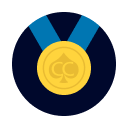Luvepoker
Lost in the twilight zone
Community Guide
This may sound a little strange, but I am very biased on this one. If I were talking to this type of person who wanted to become better I would send them to CardsChat.
The reason I would do this we here have an opportunity to help each other. We're community of players some are very new and broad and just learning the game but there are also some players who may be very advanced players. I would suggest to this type of person to ask questions and even ask specific members that they respect might be willing to actually help answer a question or two and give them advice. At one time in my poker career I was in your situation where I couldn't do a lot of stuff paid wise what was part of poker school online and became part of a private group within it. How much I've learned in a year and a half span being part of a group like that just asking questions listening to good players talk to good players on hand histories and even just watching each other play and giving each other advice. When I was part of that group I was the weakest link but we also had some very good players who had won which states poker tour championships. What would allow a person in this type of situation to ask questions is they're all so helpful players. How many times are we asked what are they thinking why did they do that well that was how I helped describe it group. We all start from the beginning but we really don't remember what we were thinking of doing when we first started because we're working on trying to become a better player. Once we come a proficient player we start the question why people do things and how they play so we can beat them. This is how good players can even learn from the bad players.
The reason I would do this we here have an opportunity to help each other. We're community of players some are very new and broad and just learning the game but there are also some players who may be very advanced players. I would suggest to this type of person to ask questions and even ask specific members that they respect might be willing to actually help answer a question or two and give them advice. At one time in my poker career I was in your situation where I couldn't do a lot of stuff paid wise what was part of poker school online and became part of a private group within it. How much I've learned in a year and a half span being part of a group like that just asking questions listening to good players talk to good players on hand histories and even just watching each other play and giving each other advice. When I was part of that group I was the weakest link but we also had some very good players who had won which states poker tour championships. What would allow a person in this type of situation to ask questions is they're all so helpful players. How many times are we asked what are they thinking why did they do that well that was how I helped describe it group. We all start from the beginning but we really don't remember what we were thinking of doing when we first started because we're working on trying to become a better player. Once we come a proficient player we start the question why people do things and how they play so we can beat them. This is how good players can even learn from the bad players.



















